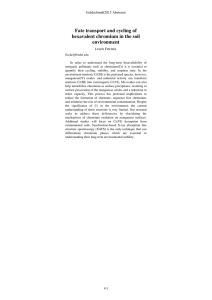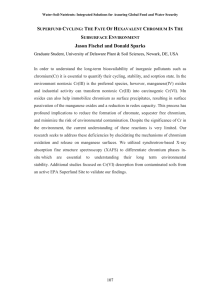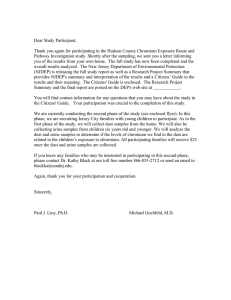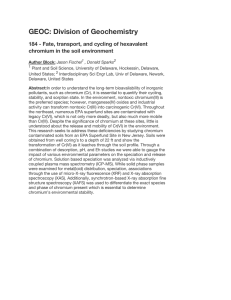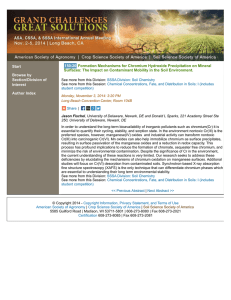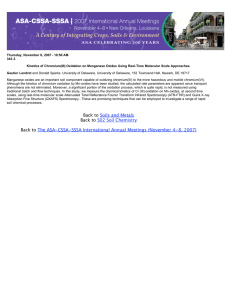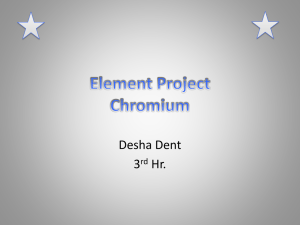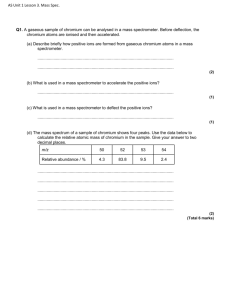Hudson County Chromium Exposure Route and Pathway Investigation Presentation by Dr. Kathy Black
advertisement
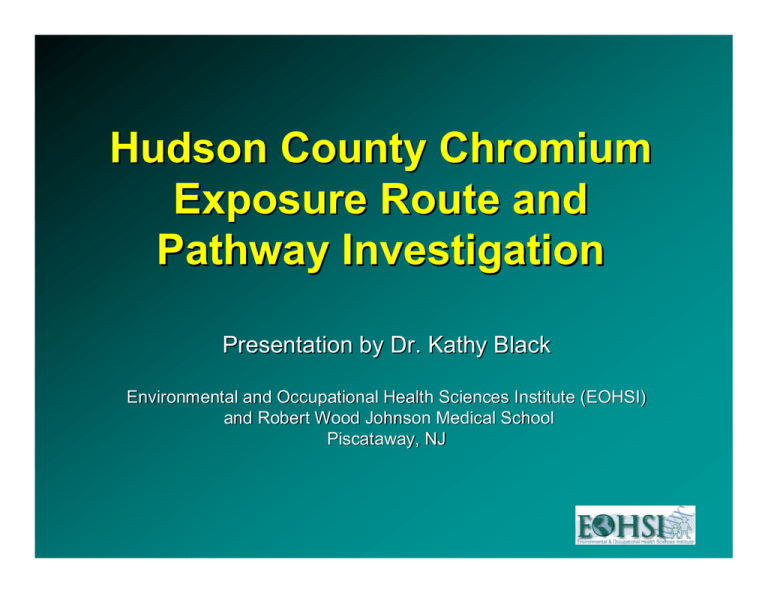
Hudson County Chromium Exposure Route and Pathway Investigation Presentation by Dr. Kathy Black Environmental and Occupational Health Sciences Institute (EOHSI) and Robert Wood Johnson Medical School Piscataway, NJ EOHSI Study Personnel Principal Investigators Dr. Paul Lioy Dr. Michael Gochfeld Co-Investigators Dr. Stuart Shalat Dr. Zhi-hua (Tina) Fan Recruitment Coordinators Dr. Kathy Black Ms. Marta Hernandez Human Exposure Science Our Division’s Operating Definition of Human Exposure Science*: studies human contact with chemical, physical or biological agents occurring in their environments, and advances knowledge of the mechanisms and dynamics of events either causing or preventing adverse health outcomes. Journal of Exposure Science & Environmental Epidemiology Definitions Exposure Occurs when a person comes into contact with a chemical, biological or physical agent. Exposure pathway Is how the substance moves from the source to people. Exposure route How a substance contacts the body (inhalation, ingestion, dermal) Background Many chromium waste sites are located in Hudson County, NJ. Only certain types of chromium may cause illnesses, including cancer. In the past it was difficult to determine which type of chromium was present. Some chromium waste sites were capped. There are concerns that capped sites cause exposure to residents and about what type and how much chromium is present in homes. Results of Previous Studies Some people were exposed to chromium. Removal and containment of soils containing chromium at residential sites lowered levels in household dust and participant’s urine. Measurement of chromium in household dust is a good way to determine if there is potential exposure to chromium in the home. Goals of the Current Study Determine if chromium is present in homes and use improved analysis to identify the type of chromium Hexavalent – lung carcinogen Total chromium – hexavalent and trivalent Identify the pathways of exposure Air Direct contact & track-in of dirt or dust Leaching out of sites Need for Community Input Identify the sites of concern Site conditions observed by residents Conditions observed in surrounding homes Changes in the community and site conditions since the site was first identified Conduct sampling Volunteer for in-home sampling Identify Sites of Concern for Residential Exposure Review available data Site size and status Concentrations of chromium State of remediation Concentration of homes around the site Information from the Community Sampling Air sampling on or near the waste sites Indoor dust sampling in volunteer homes near Chromium sites Community Indoor Sampling Contact the residents Select a group of volunteers Complete questionnaires and inhome dust sampling Home Visit – 1 Hour Questionnaire Dust collection – undisturbed surfaces from one or more of the following locations Windowsill facing the waste site Main living area Basement Analyses Dust Samples Type of Chromium Amount of Chromium Questionnaires Identify Exposure pathways Indoor Chromium contamination Other sources of Chromium Residential Results will be Presented to: Participants State & Community Groups Pooled results Individual results from home from his/her home sampling Comparison to General Statistical pooled results Analyses Questions How much does sampling cost? There is no cost to have your home sampled. When do I get results? Because many homes will be sampled, it will take several months to analyze all the samples. If we find high chromium in homes Participant It means that there is a potential for exposure. We may ask for permission to take more samples. Using the pathway information, we will make recommendations about some steps you can take to reduce potential exposure until the exposure pathway is stopped at the source. If we find high chromium in homes State The site(s) near the homes is (are) a source of exposure. Actions must be taken on the site to prevent exposure. Follow-up studies may be needed to assure the community that the exposure has been stopped. Interested Residents Sign-up sheet or, Toll-free number: 866-855-2712 Recording Leave your name, phone number English or Spanish
